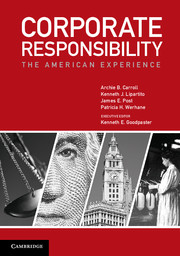Book contents
Foreword
Published online by Cambridge University Press: 05 November 2012
Summary
Foreword
As the CEO of General Mills, I have seen firsthand the change in attitude toward corporate responsibility. Shareholders, customers, employees, and host communities today increasingly demand responsible, even enlightened, engagement in matters that go well beyond a corporation's earnings of the last quarter. I believe this interest is driven by a yearning for principled behavior – for clear and strong values – in all American institutions, including business. Stockholders still want to know about sales and earnings, of course. But today they also want to know that a corporation is committed to “doing the right thing,” as we say at General Mills. They want to know how we treat our employees, and how we are improving the health and safety of our products. They want to know our commitment to the sustainable use of resources in our products and about our engagement and support of the communities where we reside. They correctly see corporations as large and powerful institutions that should be engaged in the right behavior with respect to all of these issues. And they expect us to do the right thing, all the time. This book appears at a timely moment. Many business leaders are clearly rethinking what it means to be a truly socially responsible company, and this important work helps us understand not only the history of corporate responsibility, but also its evolving future.
General Mills’ story largely parallels the history of corporate responsibility. The company began on the banks of the Mississippi River, where our founder, Cadwallader Washburn, built the canal that channeled the water power of St. Anthony Falls. His visionary investment spawned a milling industry that would become the largest in the world and would create the economic foundation of Minneapolis. Washburn's first mill, built in 1866, was one of the largest in the world and became known as “Washburn's Folly,” for surely even Washburn could not sell that much flour. In a post-Civil War era of fledgling milling companies and brutal competition, Washburn chose as his partner John Crosby, known for his reputation as “Honest John.” Washburn and Crosby expanded sales across the United States and into Europe.
- Type
- Chapter
- Information
- Corporate ResponsibilityThe American Experience, pp. xiv - xvPublisher: Cambridge University PressPrint publication year: 2012

